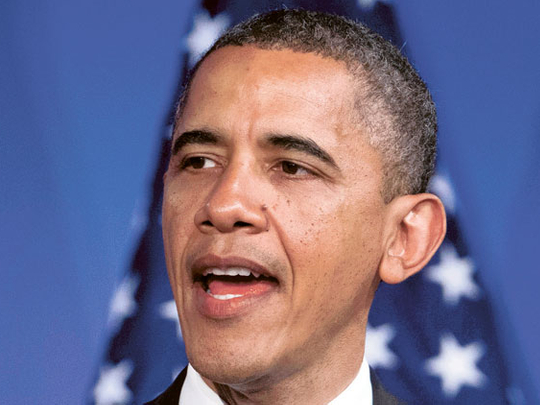
A great power without a significant enemy? That is what the US. Osama Bin Laden is dead. Al Qaida is reportedly a shadow of its former self. The great regional threats of the moment, North Korea and Iran, are regimes held together by baling wire and the suffering of their own populaces. The only incipient great power rival on the planet, China, has just launched its first aircraft carrier, a refurbished Ukrainian throwaway from the 1990s on whose deck the country has no planes capable of landing.
The US, by contrast, has 1,000 or more bases around the world. It spends as much on its military as the next 14 powers (mostly allies) combined. It will spend an estimated $1.45 trillion (Dh5.33 trillion) to produce and operate a new aircraft — the F-35 — and that is more than what any other country, the US included, now spends on its national defence annually. The US Navy, with its 11 nuclear-powered aircraft carrier task forces, dominates the global waves. The US Air Force controls the skies in much of the world. And the US President now has at his command two specialised armies to supplement the traditional armed forces: The CIA, which has been heavily militarised and is running its own private assassination campaigns and drone air wars throughout the Middle East and environs; and the Joint Special Operations Command, cocooned inside the US military, whose members are deployed to hot spots around the globe. By all the usual measuring sticks, the US should be supreme in a historically unprecedented way.
And yet, it could not be more obvious that it is not.
Despite its overwhelming military superiority, nothing seems to work out in an imperially satisfying way. Given America’s lack of enemies — a few thousand jihadis, a small set of minority insurgencies, a couple of feeble regional powers — what prevents Washington’s success? Certainly, it’s in some way related to the decolonisation movements, rebellions and insurgencies that were a feature of the last century. It also has something to do with the way economic heft has spread beyond the US, Europe and Japan — with the rise of the “tigers” in Asia, the explosion of the Chinese and Indian economies, the advances of Brazil and Turkey and the movement of the planet towards some kind of genuine economic multipolarity. It may also have something to do with the end of the Cold War, which put a halt to several centuries of great power competition and left the US as the sole “victor”.
Perhaps it is better to think of the growing force that resists such military might as the equivalent of “dark matter” in the universe. We may not understand it fully, but the evidence is clear that it exists. After the last decade of military failures, standoffs and frustrations, you might think that this would be apparent in Washington. And yet, here’s the curious thing: Two administrations have drawn none of the obvious conclusions and no matter how the presidential election turns out, that will not change. Even as military power has proved itself a bust again and again, policymakers have come to rely ever more completely on a military-first response to global problems, operating on some kind of militarised autopilot.
Take Libya, for example. It briefly seemed to count as a rare American military success story: A decisive intervention in support of a rebellion against a brutal dictator. No US casualties resulted, while American and Nato air strikes were crucial in bringing a set of ill-armed, ill-organised rebels to power. In the world of unintended consequences, however, the fall of Muammar Gaddafi sent Tuareg mercenaries from his militias, armed with high-end weaponry, across the border into Mali. There, when the dust settled, the whole northern part of the country had fallen under the sway of extremists and Al Qaida wannabes.
Then last month, the first American casualties of the intervention occurred when Ambassador J. Christopher Stevens and three other Americans died in an attack on the Benghazi consulate and a local safe house. So what is the US reaction? Yet more military action. According to the Washington Post, the White House is planning military operations against Al Qaida in the Islamic Maghreb, the terrorist network’s North African branch, which is now armed with weaponry from Gaddafi’s stockpiles. And according to the New York Times, the Obama administration is “preparing retaliation” against those it believes killed the US ambassador, possibly including “drone strikes, special operations raids — like the one that killed Bin Laden — and joint missions with Libyan authorities”.
Further destabilisation is a given. One could postulate explanations for why American policymakers, military and civilian, continue in such a repetitive and self-destructive vein. Yes, there is the military-industrial complex to be fed. Yes, we are interested in the control of crucial resources, especially energy and so on. But it’s probably more reasonable to say that a deeply militarised mindset and the global manoeuvres that go with it are by now just a way of life in a Washington eternally “at war”. Military actions have become the tics of an overwrought great power with the equivalent of Tourette’s syndrome. They happen because they cannot help but happen, because they are engraved in the policy DNA of America’s national security complex. In other words, American leaders cannot help themselves.
Tom Engelhardt, co-founder of the American Empire Project and the author, most recently (with Nick Turse) of Terminator Planet: The First History of Drone Warfare, 2001-2050, runs the Nation Institute’s TomDispatch.com, from which this piece was adapted.










